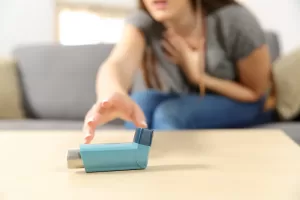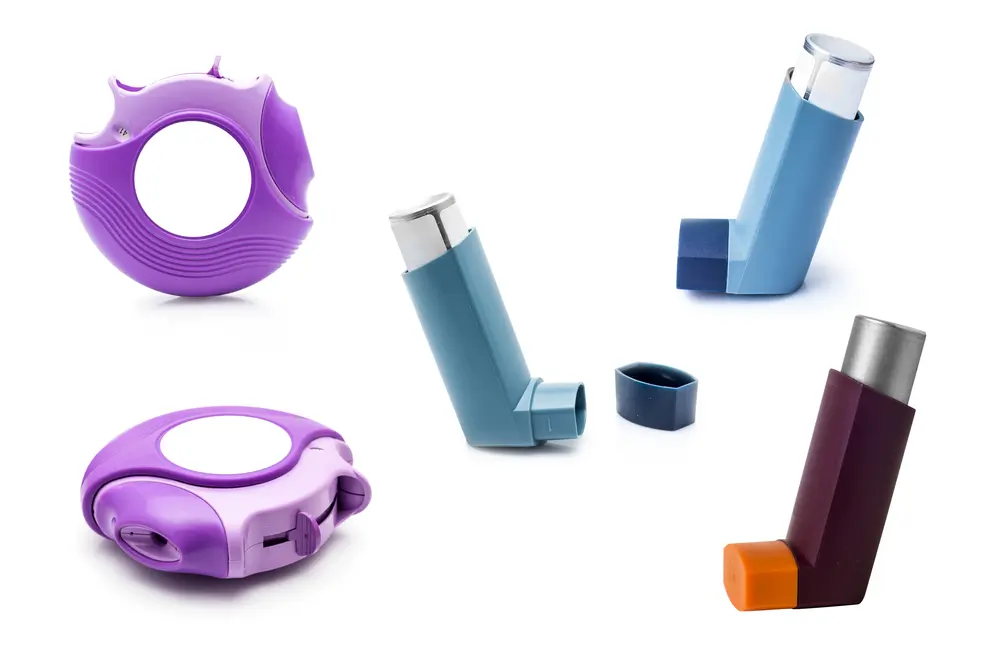Do I have Asthma? How is it diagnosed?
What is asthma?
- The airways (tubes) that take air from your throat to your lungs are surrounded by tiny muscles. These muscles are involuntary – you have no control over them. When they contract (squeeze), the airways become narrow and air can’t pass through them as easily.
- Certain triggers, such as pollen or dust, can cause these muscles to contract, or they can contract spontaneously for no obvious reason.
What are the symptoms of asthma?
- The narrowed airways result in breathlessness, wheeze, cough and chest tightness.
- If untreated and severe it can lead to death.
Who gets asthma?
- Asthma can affect up to 1 in 5 people.
- It can run in families – ie. it is linked to genetics.
- It’s associated with other conditions such as eczema and hayfever.
- It’s commoner in smokers.
- It can also be associated with obesity.
- It can start at any time in life.
- It can be triggered by exercise.
How is asthma diagnosed?
- The diagnosis should be made by a doctor, based on symptoms of asthma, the examination findings and the response to treatment.
- Most people over the age of 6 or 7 can have breathing tests to confirm the diagnosis. In young children the symptoms of asthma may be adequate to make the diagnosis.
What is the treatment for asthma?
Avoidance of triggers & reduction of risks
- For example, getting advice on how to reduce exposure to dust or pollens.
- Breastfeeding children (if possible) reduces their chances of being asthmatic.
- Reduction in weight where appropriate.
- Quitting smoking.
- Annual flu immunisation.
- Avoidance of certain medications, most particularly “Beta Blockers”.
- Avoidance of viral infections
Medications
- Prevention of symptoms before they start (Preventer inhalers or tablets).
- Relief of symptoms after they have started (Reliever inhalers).
What are the medications commonly used as treatment for Asthma ?
- Preventers
- Steroid inhalers – reduce the inflammation that causes the muscles around the airways to contract.
- “Long-Acting Beta Agonist” (LABA) inhalers – relax the muscles around the airways.
- “Leukotriene Antagonist” tablets – reduce the inflammation that causes the muscles around the airways to contract.
- Relievers
- “Short-Acting Beta Agonist” (SABA) or- relax the muscles around the airways.
- “Anticholinergic” inhalers – relax the muscles around the airways.
- There are other less commonly used treatments which are mainly used by hospital specialists.
- Most conventional asthma inhalers are more effective if given via a “spacer”. However, some inhalers don’t work with a spacer.
How do I know if my asthma is well controlled?
Among other things:
- You don’t wake at night with a cough or wheeze.
- You rarely or never need a reliever medication.
- You can do all the exercise you want without getting wheezy.
- Your breathing is unaffected during the day.
Are there any complications from asthma?
- The main complications of asthma are the immediate risk of severe attack (which can be fatal) and also the impact on wellbeing in the medium term.
- Asthma can also lead to other serious lung disorders if it’s inadequately controlled long-term.
If you have more questions or concerns about asthma, speak to your GP. For asthma in kids, check out the Royal Children’s Hospital website.
Getting a Mental Health Care Plan in Australia: Your Guide
Getting a Mental Health Care Plan in Australia: Your Guide Mental health matters—and if you’re feeling overwhelmed, anxious, or down, a mental health care plan can help. But what is it, and how do [...]
UTI Symptoms and Treatment: What You Need to Know
UTI Symptoms and Treatment: What You Need to Know Urinary Tract Infections (UTIs) are common, uncomfortable, and often disruptive. But what exactly are the signs to watch for, and how can you get relief [...]
Free Mental Health Care Plan Online | Bulk-Billed by Qoctor
Free Mental Health Care Plan Online | Bulk-Billed by Qoctor Discover how to get a free, bulk-billed Mental Health Care Plan (MHCP) in Australia through Qoctor's telehealth service. Accessing [...]






